I don't feel dirty saying it's centralized because-
It's the execution of a centralized network that makes centralization terrible! Not the model itself! The blog of S-Config is a centralized network. Meaning that individuals paid money to a data center to host content at a single point of location for the rest of the internet to come in and acquire. This means that we share the same core philosophy as Facebook, Twitter, and the DOT com version of WordPress. But where we part ways is not forcing you to log in and identify yourselves. Because of this, although we have accounts on places like Mastodon. We don't advocate decentralization completely.
Read on if you wish to experience the diatribe.
Centralization / Decentralization / Distributed
Before we continue on with this article we should probably bring our readers up to speed as to exactly what in the hell we are talking about here. That there are currently three classifications as to how networks operate and behave within the vastness of the internet:
Centralized model:
This is probably the most common organizational infrastructure that you will find on the internet. Ranging from Facebook, YouTube, Twitch, Instagram, Twitter, and Office 365, you name it! Centralization is the concept where an individual or group of individuals underneath a hierarchical structure such as a business sit down and open up a website for people to visit and/or use. A server (or cluster of servers if running on a CDN) is the central access point and users then go to said server to access the data. A handful of people make %100 of the decisions as to how the centralized network will proceed.
Since they are a business and are very much aware that the world doesn't operate on happy thoughts and goodwill. Money in order to make everything work. In some cases, these centralized structures will charge a monthly fee to be a part of their active community to which they will grant you rights to their services such as Office 365 and Adobe Cloud. In other instances such as Google, Twitter, and Facebook, they know their crowd and the fact that they would be unwilling to pay for their services so they offer them theoretically for free to people who feel entitled to use them. The money comes in based on the data.
How do people use their service? What do they like? What kind of technology do they have? This is data-mining and predominantly how a lot of the "Free" services that you the reader use on the internet make their money. Even if you are a part of a service such as Twitch Prime for example. The data is still subsequently collected while only withholding commercials to the people that use their service. Money in that scenario is made from both the user and analytics.
Ultimate centralization would almost call back to the days of Bulletin Board Systems or (BBS) which would be the more appropriate acronym. Where you would dial into a computer that someone is keeping on a phone line and you connect and thus share information between that one bulletin board.
Decentralized model:
Decentralization is a different organizational structure where instead of one server ruling all it's instead set up by a community or cluster of servers that host/mirror similar content between one another. Decentralized networks require groups of people to come together and agree upon a topology that everyone not only understands but also is secure enough to make sense so that an entire chain of servers doesn't end up getting completely hacked. These people will act as 'nodes' within the network where information travels from client to client.
Early examples of Decentralization would be projects like PeerTube, and Mastodon.
Money is still involved in Decentralization for all of the servers/bandwidth and time but all of it is either volunteered or given with the intent of fighting a cause to destroy a particular centralized network. All decisions within a decentralized network are democratic in theory. This means all would have to agree and if there is a split in the decision-making process then a group is either faced with a die-off. Or, branch into their own entity.
It should also be noted that if you were to describe the internet ranging from ISPs, web providers, and Domain Name Servers; They all actually follow the rule of decentralization. This very server is in part a chain of a much greater network. However, we're just focusing on the organizational aspects of how networking works within the internet.
Distributed Model:
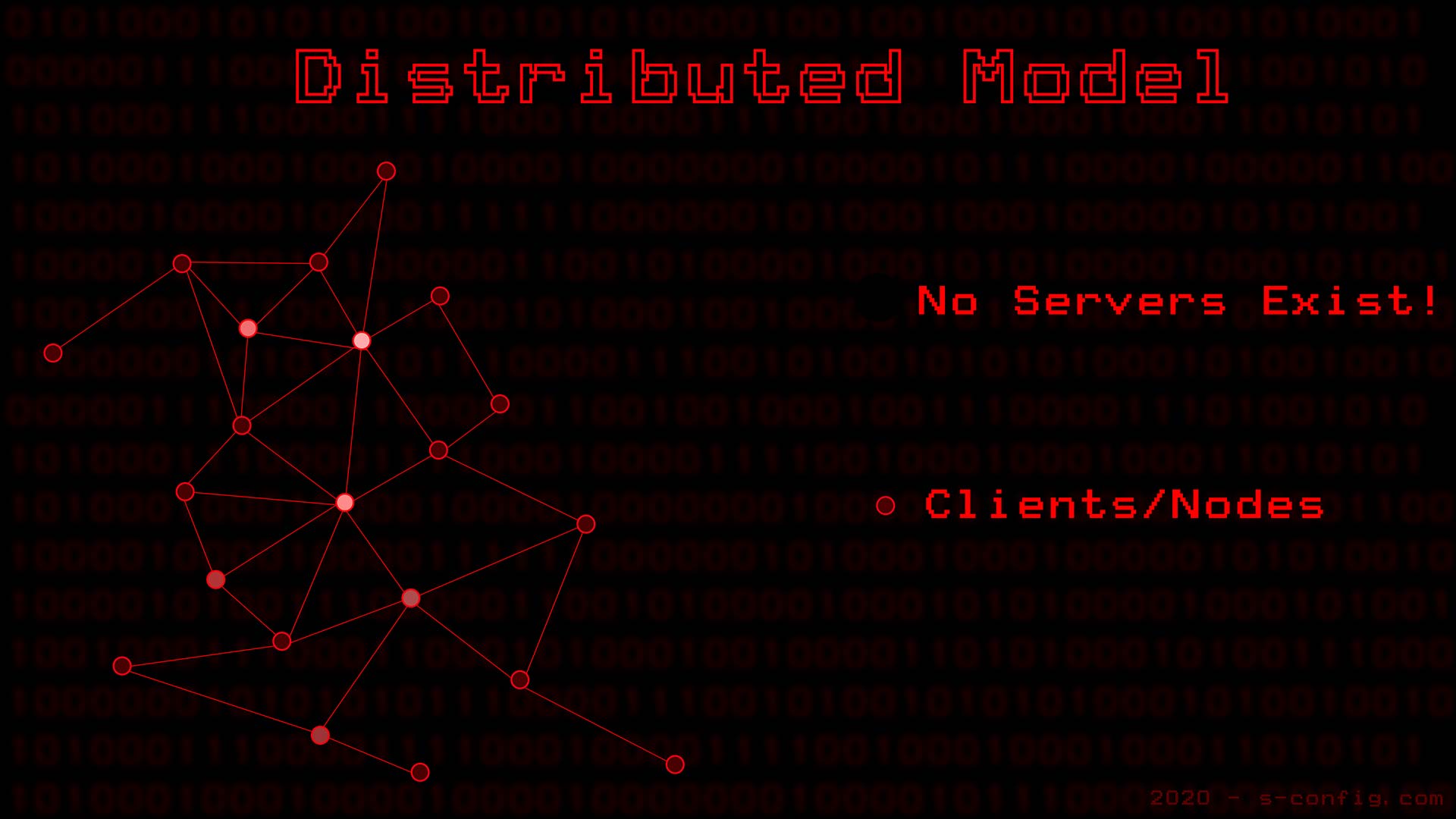
After looking at YouTubers, Bloggers, and even certain tech magazines. I think people seriously confuse decentralized with distributed. We're not going to make the same mistake!
A distributed model of networking is one where a user obtains a token or entry point be it off of a source centralized website or even via e-mail or messenger from a friend. Once the token is received the user can then insert this into a client to which they can begin sharing information with others who have also received this entry point and/or token. Although there are some peers/clients/nodes which hold more data than others. They all strive to attain synchronization between each other so data is shared equally.
This is by far one of the rarest models on the net but also is more notable than decentralization.
Great examples of a distributed network are BitCoin Mining, BitCoin wallet hosting, and torrent file-sharing.
There are of course less nefarious forms of distributed networking out there like the Seti@home project in which you donate CPU computing power to the scientific communities.
The model of self:
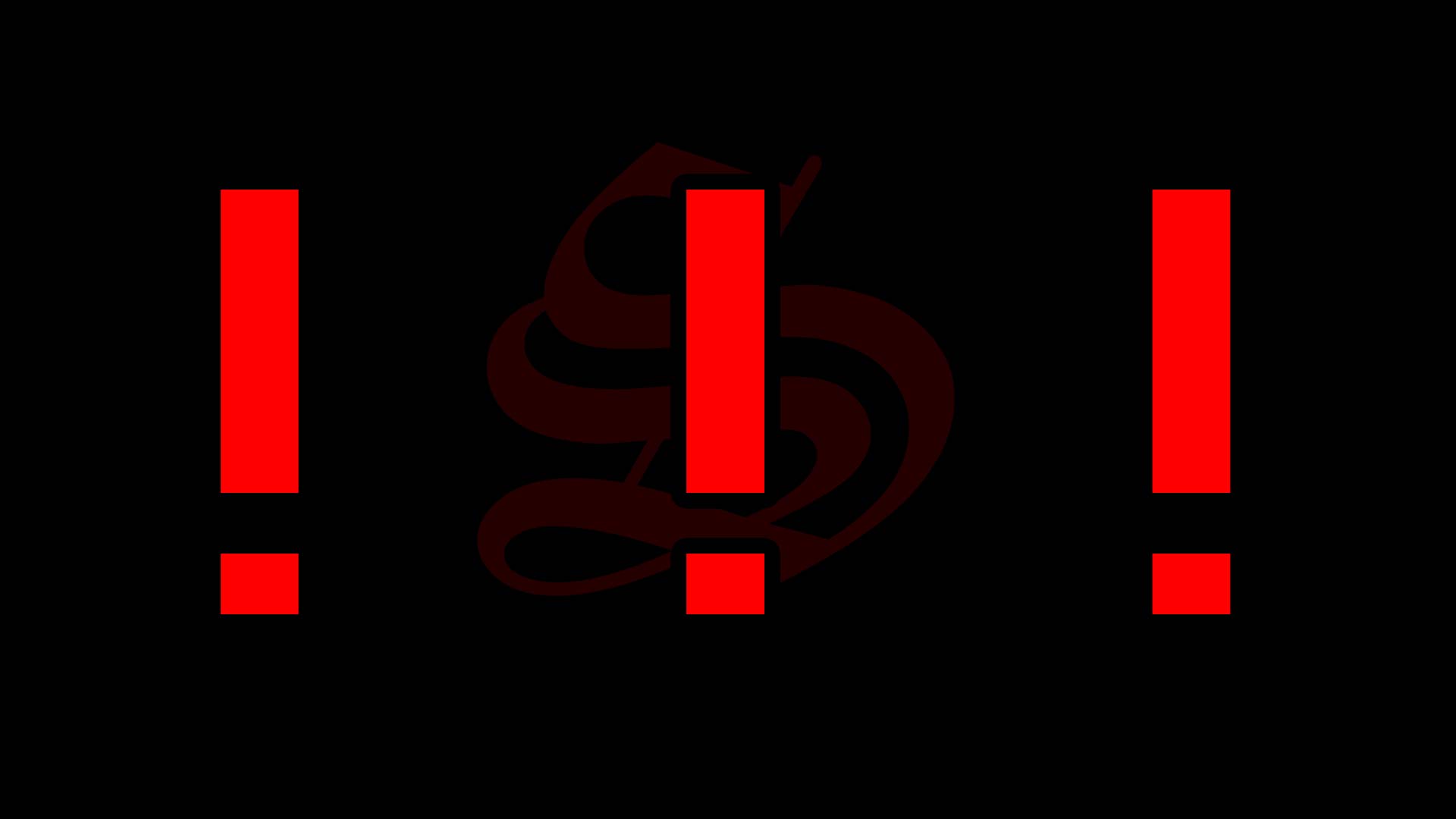
How does this site stand in the mix?
Short answer? Centralization Model. Or, at least as close as one can get on the internet.
- This server does NOT run in a democratic model. While we do listen to suggestions from people the ultimate decision is up to the admin of this site.
- We do not want/care about your data. We just want you to read articles and be safe out there. Buy a VPN while you're at it! More info is in the FAQ for those interested.
- We do not use analytics or ads which is rare for a centralized server. The server bills are nice and low and there's no need to screw up the blogging environment with ads.
- This site DOES use the WordPress CMS platform. However, all communication between this site and the WordPress(DOT)com site is separated. We are not a part of their network and they are not a part of us.
- We don't require the use of 'user accounts to gain access to data which we suppose is another oddity we have with the centralization model.
- Because we don't have user accounts we also don't 'intercept mail'. We have a hard enough time reading our own mail!
Mastodon - We're out!

Weren't you shilling for Mastodon rather hard?
To be clear. We're not putting down the band "Mastodon" which is the first thing you'll find on Google. That's a legit band. Go to their concerts and buy their albums. Support Musicians.
From here on out we will be talking about the social network also known as Mastodon.
And to answer the question, yes we were shilling hard for them! Past tense!
During the era of Facebook data breaches; Mastodon seemed like a positive alternative for a social network to exist within. Even though Mastodon better describes themselves as social network blogging. Let's be real about the platform for a moment, 500 Characters for a blog entry isn't "Micro-Blogging". Mastodon is a social network platform and needs to stop spinning itself beyond something it really is.
For a time, this seemed perfect. Take the power and the censorship rights away from the big bad corporation and give it to the little guy. After a while, however, we discovered that the problem wasn't the corporation. The corporation was simply suffering from the same symptoms as the individual which is "Mental Issues." People are not machines, and thus are prone to opinions and error. Thus, Mastodon suffers from the same problems if not worse than Twitter or Facebook.
So in retrospect, our opinions of the Decentralized social network have changed.
To better understand this we're going to break things down here.
Censorship.
No distributed networking is innocent on this subject. Hell, even we're guilty of it because there are some comments that come here that are filled with such hatred and vitriol it deserves to be put where it belongs. Into the garbage!
Larger sites tend to take it to a completely different level:
Centralized censorship:
Twitch and Twitter are probably the most infamous for this (Even facebook for political activism) It's no surprise that sites like our tendency to hate corporate-level censorship. YouTube has been on our radar over and over and over again. Twitch as well for similar reasons. The baseline with many businesses is simple.
I want to make money.
and......
I don't want to get sued.
From the insane music copyright system that the US has instilled upon YouTube and Twitch. YouTube homogenizes the creativity of individuals to avoid certain words. To spying on little children. Almost every reason for what a major centralized network does in terms of censorship could be thrown into one of these two categories. Even the censorship of political speech is on the table because many of these large networks have hit a saturation point in the US and Europe and want that sweet-sweet Chinese communist party money. If they have to silence a handful of their users to get it then so be it!
In general, if you are not going after their bread and butter. These centralized giants don't give a fuck what you do on their servers. Just as long as you keep using them and make them money from data!
Decentralized censorship:
On the opposite end of the spectrum, you have a very different form of censorship from a decentralized environment with respect to social networks like Mastodon. That it's the people and moderators that have paid money for the servers that determine what you can say, do, or think. Depending on the server you join your moderator could be a benevolent individual or a flat-out social justice warrior. Unlike the monolithic presence of a corporation that attempts to put down guidelines for rules of conduct. You are at the mercy of whoever you joining. So the decentralized network that you join better be your friends
Mastodon has the thing called a "CW" or "Content Warning." That every moderator encourages users to use it if their opinions are controversial. That way, those more sensitive can simply see a word like "Politics" for example, and keep scrolling instead of getting "triggered" and/or traumatized by what they read.
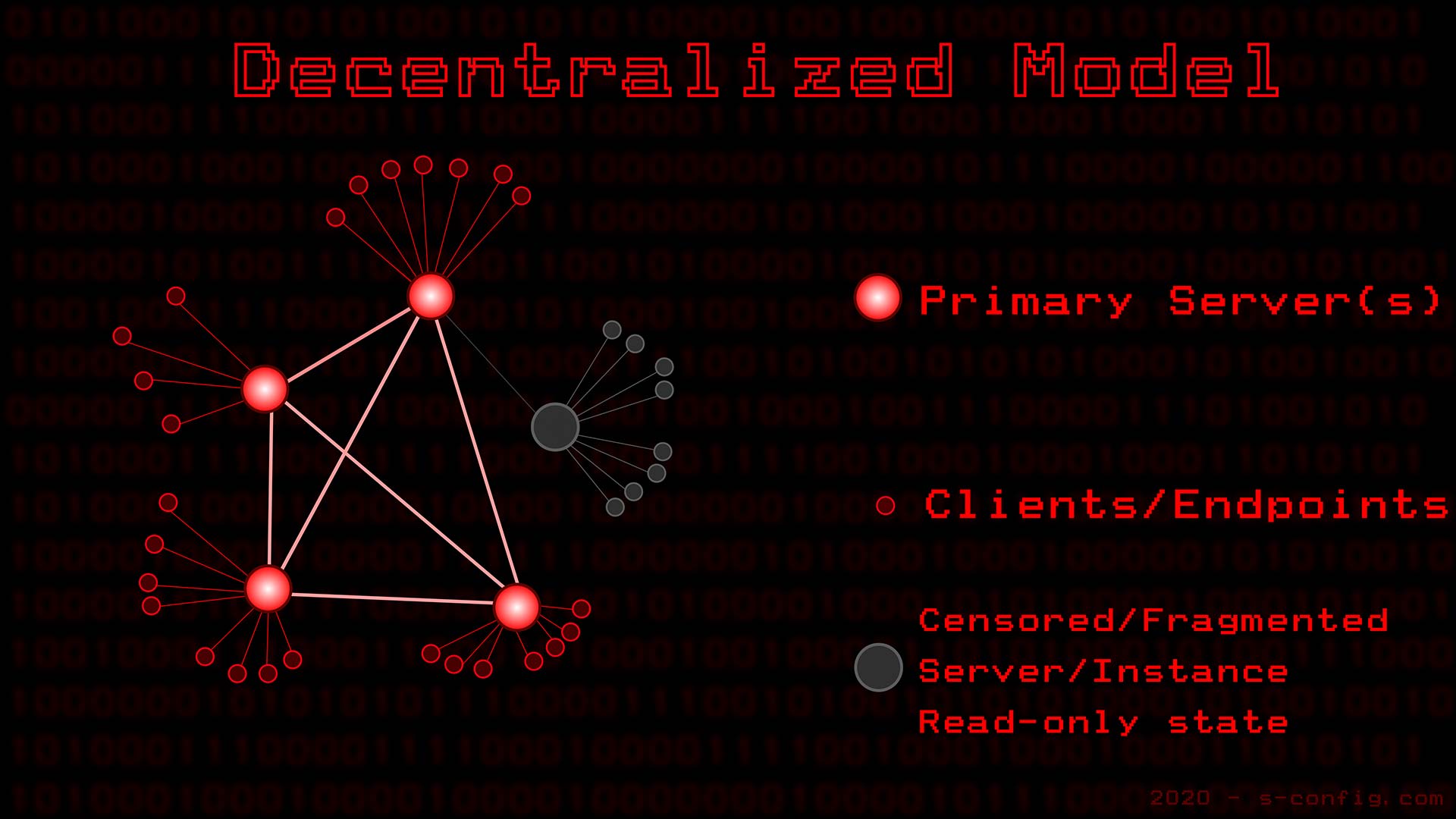
If a user decides to ignore the "CW" system. The person owning the network could quietly silence them preventing their message from being replicated to the rest of the network. Or worse yet, if it's a server operator that has controversial opinions other operators can simply 'disconnect' from that negative influence. This leaves the users within a Decentralized environment only seeing fragments of the entire network. If a moderator wanted to block all servers related to "star-trek" they could. Network Fragmentation to the point where it's just a bizarre in-club of "tech bros" and political activists could be the only thing you end up getting after a while of being on just one instance.
In a sense. It's the worst of both worlds! Because you have moderators taking it upon themselves to determine what their users see. The moderators are in turn judged by OTHER moderators because if they get enough bad apples from their server then their server could get blocked which leads to a downward spiral. And you leave your user-base paranoid wondering what minorly controversial opinion they may have that could set off their community to silence them from the rest of the known universe.
Eventually, a decentralized social network runs the potential of devolving into the same groupthink that they accuse their own competitors without ever seeing the hypocrisy of their situation.
Distributed censorship:
Does not exist. Because if data can be removed it's no longer equal. There were instances of this in the bitcoin blockchain where users would test this theory called "CryptoGraffiti" where users could encrypt messages or even jpeg images into the blockchain. Users would inject images designed to piss off certain governments in the hopes that the government acts and blocks the entire blockchain from their country. locking out potential miners and holders from using the crypto market.
It didn't work.
By the very nature of a distributed network. The moment the data is uploaded to the network. It's distributed equally to all. Regardless of the content of the binary data.
Stability.
The next subject is stability and how data gets from the server to the user.
Centralized stability:
This relies on the principle that the centralized environment makes money or can pay the bills to keep itself online. If this is not feasible then the server disappears. Taking all of the information down with it in one go. If Twitter, for example, files for bankruptcy tomorrow and redirects its entire site to a static page saying:
We're done! Peace! Thanks for the rule 34 fish!
There's really nothing an end-user can do about it.
There are services such as the internet archive which under the digital Millenium act can scrape centralized servers in an effort to preserve them. However, most of those services are operating in a grey area where content is technically taken from a site and eventually even those sites will disappear with time/lack of funding.
DeCentralized stability:
This is where decentralization touts the aspect that just because no one is in control of the server no one can simply kill the network. Like the heads of a Hydra, if you chop off one head more will grow in its place. But circling back to the end of decentralized censorship. You run across fragmentation. Instead of seeing the entirety of the network you are instead only seeing fragments of the network based on what the admin or moderator allows you to see. Or worse yet if the server you relied upon as an entry point goes down then all of your data is still floating out in the ether with no real way to synchronize it back. You just have to jump onto another instance within the decentralized network and try again.
Finally, if there is a major disagreement with the network about something external such as politics or the direction of the way the network operates. Further fragmentation occurs which leads to branching off to new networks. If you're a user looking for a small community of people that could be like-minded then de-centralized networks may be for you. However, if you're a person looking to find new people. Or better to reach out to as many people as possible. The limited potential of a decentralized culture really holds a person back from archiving this at least within a social network platform.
Also, good luck trying to find any topics of discussion within a fragmented network. You'd be better off using the gopher protocol or dealing with Usenet.
Distributed stability:
This is by far one of the most reliable forms of network models out there. Because in order for a distributed network to fall. Everyone has to give up. More accurately everyone who has 100 percent synchronization must give up! Not just a select group of people like Decentralized networks or one person in a centralized network. Because of this very nature that as long as people participate; A distributed network is possibly one of the hardest networks to go down.
Stability of self:
In the event of death, this site will be erased. Pure and simple as we follow more so the rules of centralization. If there's something you liked from this site we hope it inspires you to make your own blog or centralized network. But in general, we're not out to start a cult. Now, as for those internet archive sites. Those people are riding a fine line between archiving data and content theft. There's not much to say to assholes that jack your data except that what will happen to us it will eventually happen to them as well. Time kills us all.
Nostalgia
For anyone who has been on the internet long enough. There's this concept of website nostalgia. That person used to surf the internet and get data. Now you're either met with gated communities, endless paywalls, or bounced between 32 different servers which are desperately trying to get money and/or data from you. You can simply turn on your network console in your browser with F12 and go to a news network and watch a text-only story that should take 100Kb to download and magically turn into 27Mb of javascript.
Centralized nostalgia:
Is for the most part dead. The concept of most major centralized servers is they do not want you to leave their network. They very much want a monopoly of your time. This is why most major services like Facebook, YouTube, and Twitter will employ methods to keep you in their picket fence-based network. The number one reason when asking people why to don't leave Facebook, or Twitter, or any of these networks is
My friends and family are on it - Facebook user.
This eventually becomes a self-fulfilling prophecy that these are the number one networks where they can treat their users like absolute garbage. Have their information stolen repeatedly, instill censorship policy after policy upon them. Some will cry but ultimately all return to the service with a severe case of Stockholm syndrome. With the individuals running the servers learning that they can do whatever the hell they want.
The only time centralized networks really reference back to the old days of the net is when they want to point and laugh at old free sites like Geocities and Angelfire and state to everyone how much of a failed model it was.
Decentralized nostalgia:
This is where it gets a little weird. One of the selling points of a decentralization model is to "Give the internet back to the people." Which it all sounds great at first! until you hit the groups of people within a certain social network space that few "The people" as a call for the communist manifesto. To the point where they have told sites like ours that we need regulation from an oversight committee to ensure that we speak only the best about their actions and ways of life. This site does not operate in a red country with hammers everywhere. We're super thankful that we get to moderate to our discretion with our money.
Distributed nostalgia:
I'm not sure really exists in this tangent. Because in most distributed networks it's just an ominous cloud. There's really no marketing behind such technologies save for the handful of entry-point sites that hand out the tokens/wallets/entry-point IDs.
The nostalgia of self:
Despite our own website aesthetics of being somewhere in the mid-2000s. We don't think setting up a proprietary network or re-inventing the wheel is really the way you push back on these God-Like corporate takeovers. That the old ways of setting up a website and hosting your data still works! If it didn't we wouldn't have 100k+ people downloading drivers for their Xbox 360 controller. However, the culture has changed thanks to the larger corporations where people want instant gratification instead of waiting to see if something works or doesn't. As a society, we will pay dearly for this decision. But that exceeds the scope of this article.
Searchability:
What we mean by this is the network's ability to be searched not only internally, but externally by engines as well.
Centralized searchability:
For the most part, works. Because a centralized network has a unique set of data to which external network search sites are able to look at and catalog. It's also easy for a site to be searchable internally as well as performed here on this very site. Because the data set is unique the different searching algorithms do not get confused as to who is the original source versus who is simply copying the source. There are even precautions search engines take in the event someone is attempting to hijack a particular site.
In order for a centralized site to be unsearchable. The web admin or group of people either put up a landing page that goes nowhere. or password protects it so bots can't go beyond a certain point. In other words. You almost have to go out of your way to not be searchable.
Decentralized searchability:
In the ecosphere of Mastodon as an example. Searchability almost becomes a laughable subject. From the external point of view such as Google, Bing, etc. If all of the sites host all of the same content then what's the real importance of the information? Outside of the landing page of one of the federated networks and even then if the landing page is stock most search engines will simply ignore the site together. If this is intentional and the decentralized community is closed then more power to them. If not and they want people to join their publicly federated network then it defeats the whole purpose of a social network.
From the internal standpoint, it gets worse in regards to the fragmentation that happens
Distributed searchability:
This is virtually impossible to perform from an external site such as Google as those sites were never given a token ID to join a distributed network. However, from an internal point of view, it is possible to search the contents of the data so long as you achieve 100 percent synchronization. In many cases, there is no user interface and thus you will have to find out on your own what is inside of the data that the distributed network has. In general, if the protocol does not have a search engine within its own distribution network. You will probably not be able to find said content.
Reconciliation.
We don't think that ALL networks are a bad idea. Most of the ones that we've used that do not deal with social networking are actually very noble with respect to how it keeps people safe not only from ad-tracking data but also from countries that want to monitor or worse jail a person from visiting the wrong site.
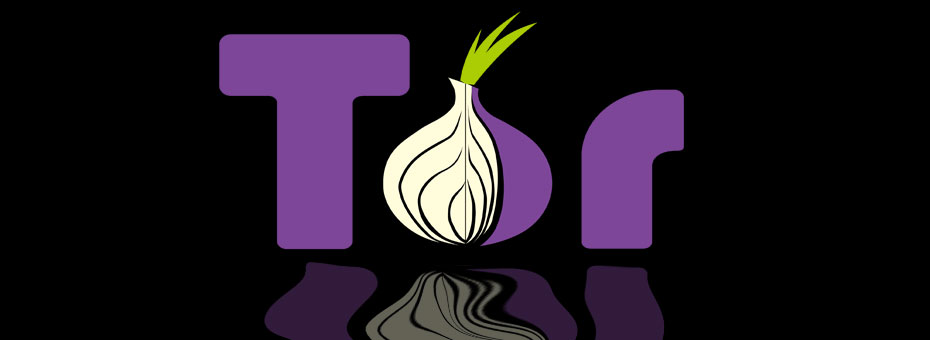
Probably the best one out there is the Tor Networks. Where they allow a distributed network to mask your geo-location so that you could quietly go through the internet for the most part undetected so long as you don't do anything dumb like sign into Facebook with it. There's the added benefit that site-admins like us could redirect users to our Tor Onion address with the new onion header system to further ensure the privacy of those browsing this very site. Click here if you want to visit their site and know more.
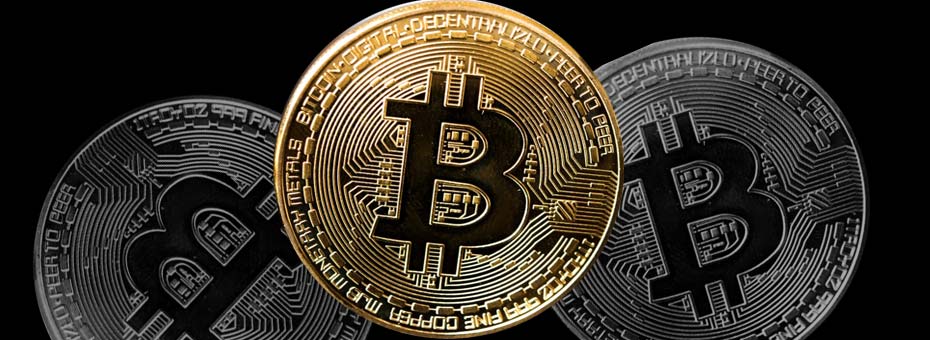
The "BitCoin" or most forms of cryptocurrency is an example of distributed networks working in the interest of finance. While there were many times throughout its history that the system was in danger. BitCoin showed us that the dinosaur practices of exchanging currency around the world are not a monopoly anymore. We know because we've used it to send money from America to New Zealand in under 10 minutes. Try that with any bank and you'll be paying out the nose for that level of speed. We paid approximately 1.2 percent for the transaction.
It should also be noted that we use bitcoin for donations as a methodology of keeping anonymity for both our readers and the blogger. Although financial support is not needed. We appreciate the shit out of anyone who donates and respect their privacy.
Final thoughts:

The number one reason why I wanted to take a stand on this is the simple fact that after talking with certain people on social networks decentralized scenes. That there is an element of decentralization that falls into the path of a really bad form of communism. Where these people believe that it doesn't matter how big you are. Or. how much money do you invest in your data center? That there should be an oversight committee that regulates speech on the net. They hide underneath the shield of social justice stating they want to make a 'cleaner healthier net'.
While we are not stupid from our ventures on the Deep-Web/Onion networks that there is some dark shit out there. It shouldn't be silenced. Silencing only drives the information (and sometimes the criminals) deeper. It should be free and brought to the light.
Of course, these individuals that believe in the regulation of free speech are completely fine with this attitude because they are the ones that are in control of said "free speech". They would probably hate it if they were underneath the thumb of another. Such as oh, we don't know, a corporation perhaps? To answer the question we are calling this special group of people on the decentralized net a group of hypocrites.
Social networks are simply used to get a message of your site/product out there like handing out flyers into a burning trash heap in the hopes of maybe a handful of people getting said flier and visiting. If this is your first time here. Welcome to my little open and free world where we get to say whatever we want because we paid for server space in order to do so. The beauty of my little centralized network is you can do the same! We encourage it. Because if everyone has their own server. Then no one is really in control like it is with Twitter, or YouTube now. Isn't it?
Personally, at the end of the day. The best answer to dealing with social networks is simply to not participate at all.
Anyhow, that's what server said.
+++END OF LINE

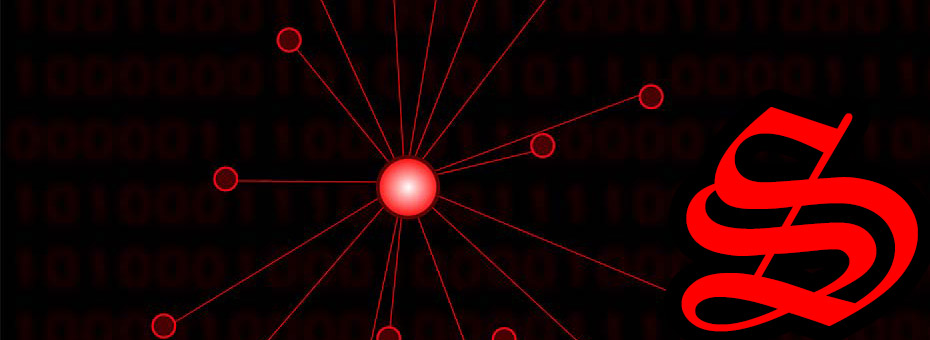
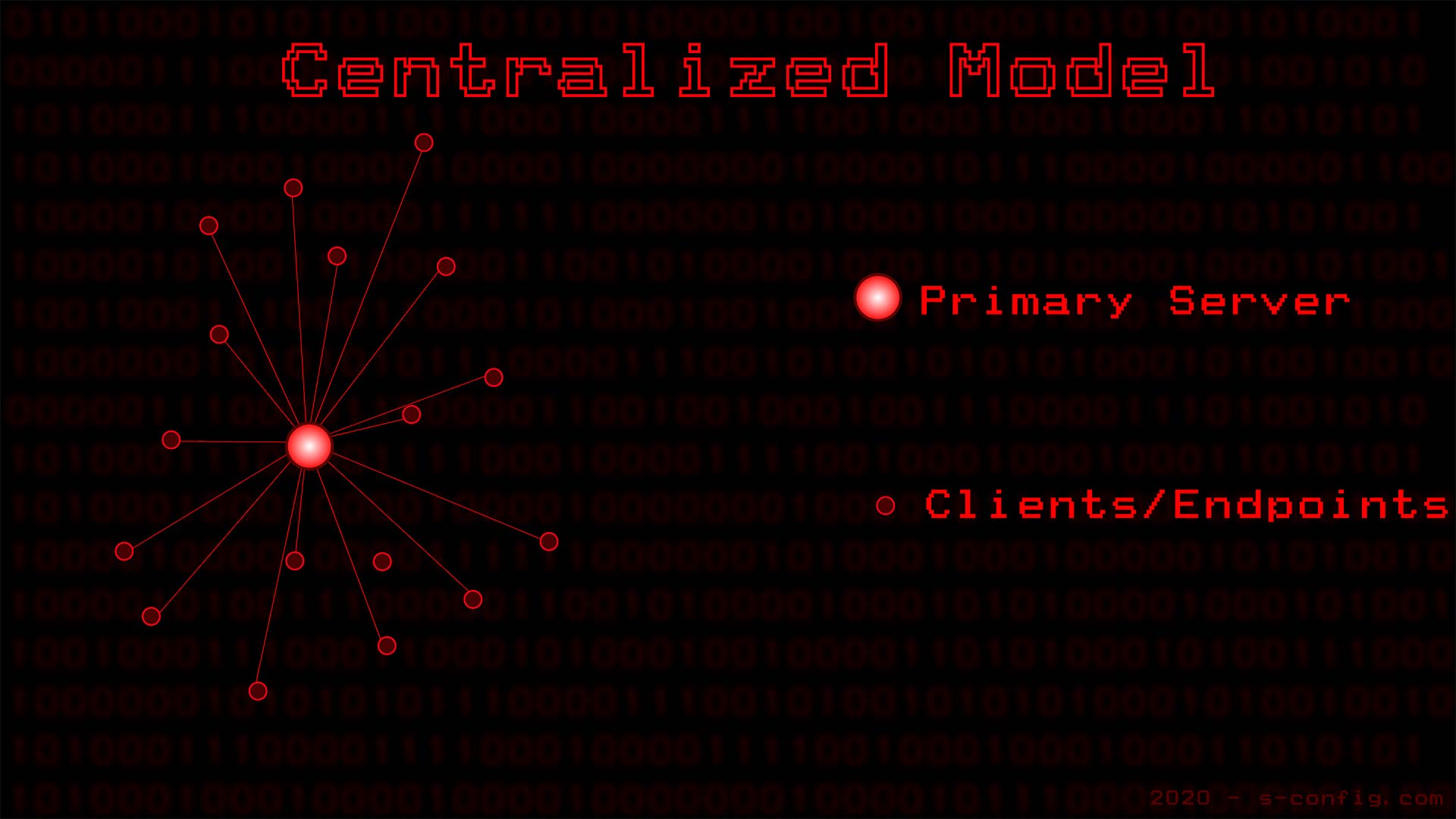
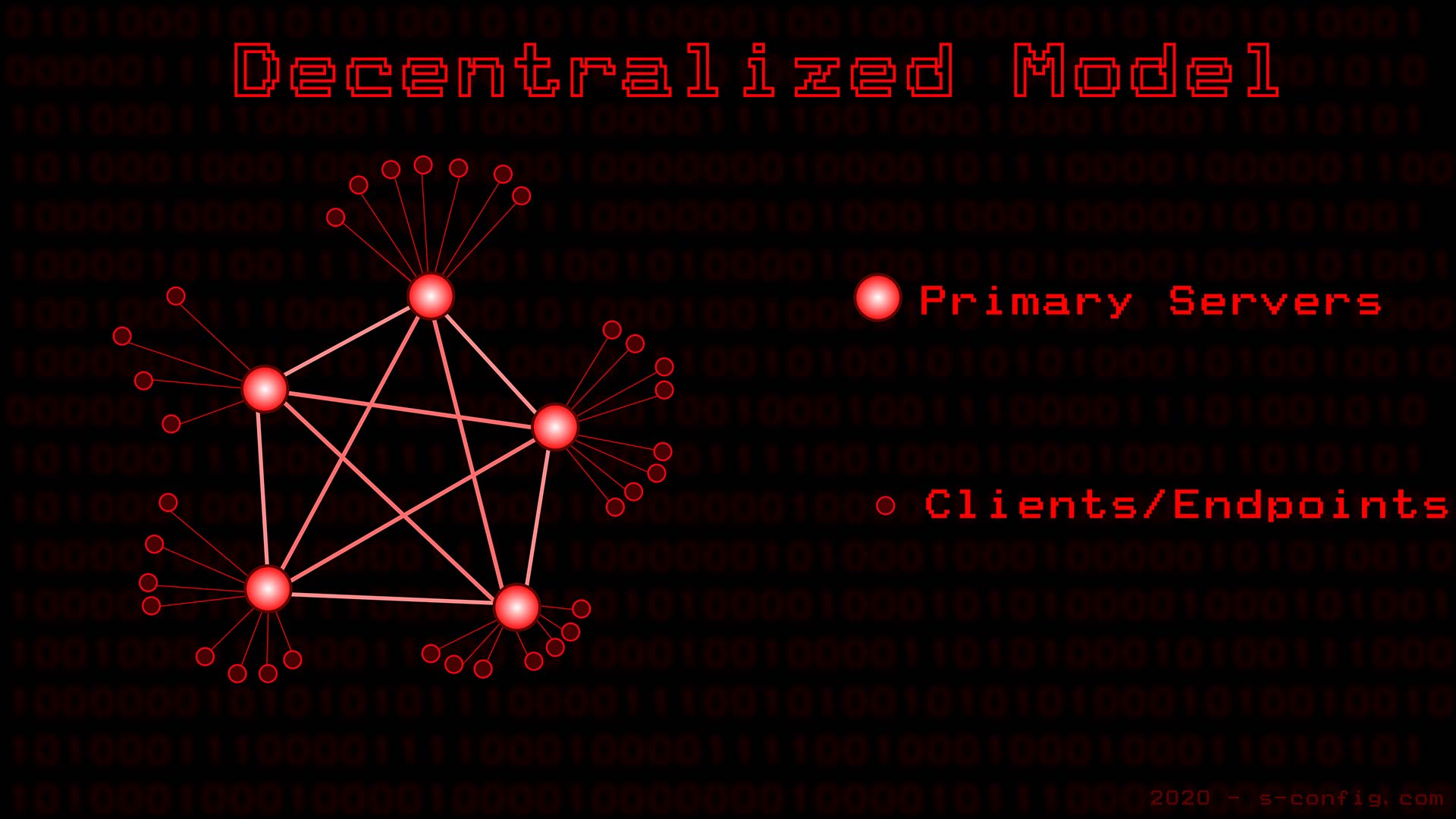
Hey,
You just answered in this post a couple of interrogations I left in another blog post.
To be honest, the technical difference between a decentralized network and a distributed network is still not clear in my mind, but at least you gave me insights and you at least showed me there was a difference I was not aware of.
I don't think you have a centralized network, and I think you, as part of a network is decentralized. I think we should consider it this way. I use Internet, therefore I pay for a connection to route my local network to an other network, the network of my ISP, and the network of my ISP routes to other networks of other ISPs. So in essence, we can say that we individually form a decentralized network. Correct me if I am wrong.
Besides, I totally agree about the fragmented problem of a decentralized network. In China you cannot access particular domains. I don't know how the firewall works, though. But in North Korea, for example, they fragmented their network from Internet by, as far as I know, not accepting BPG routes from other parts of the world. I may still be wrong, I would have to document myself more on that.
My point is, your "centralized network" is as centralized as my server, and therefore it is relatively decentralized. A little server + a little server + ... + a little server is not what I would typically call as a centralized network. Although yes, your networks attract in one point many IP addresses, it doesn't drain MANY, MANY ip addresses.
As a matter of fact, my Raspberry pi at home is a centralized server, but yet if I access to it remotely I would access to my own server, therefore a decentralized entity among a network of nodes.
So still I raised one point and one question, which is my main concern. How in a network can we achieve ease of sharing with no censorship. I suggested to use Peertube, this is what I use now. What you said is verified though, everyone could disconnect from me if I put porn or I say anything they consider wrong from their point of view or their country. Knowing that, I would still suggest to use Peertube but hosting an index of all servers and a search engine with no discrimination, which would be free from censorship by always using an index untampered. In that sense I would put the index on the blockchain.
What I said is an ongoing thought, so I wonder what is your thought on this, do you think my way is wrong and if so why. In the end I totally agree though that avoiding censorhip means using your own money to host what you want, this is what I also do.
Hello Alex,
Thanks for checking out this little blog for one. I'll try to answer your questions here.
To deal with the first part which is you do not think I'm a centralized network because there is an ISP, DNS, Routers, etc. To which if you wish to think about it that way. NO ONE is centralized. Facebook, Twitter, Google, and thus, it sort of works against the points about decentralization. Because we're already there under such a thought process!
We personally don't look at the internet in this way because ISP, Web Providers, Data centers, Routers, DNS backbones, are all transparent services. No one really *visits* 8.8.8.8 for the latest in DNS updates from Google for example. Your ISP's gateway does not necessarily have the information it directly shares but instead acts as the conduit for you the user to get to that information. These services because of their nature of being transparent (Or at least SHOULD be transparent) these services can be swapped out. I could migrate my site from my current web provider to another and your average user really wouldn't know the difference.
The hatred that we've witnessed on Mastodon is that ALL centralized networks are bad. Centralized as in Twitter, Youtube, and eventually, they even said this site. To which okay! We got it! We backed completely out of Mastodon as a result of their actions as it's brutally apparent we've been ruled the enemy. As an individual who has paid for a resource; We're evil and thus needs to be moderated by a group of people that have invested nothing towards me. Nope, that isn't going to fly.
My little rant about networks could be described as the end-point of how data is managed within the server that determines the style of the network. When a user reaches out for data. Let's say, a Linux ISO for example! They have choices. They could get it directly from the site which is centralized. funded via donations as a non-profit that hosts the files. They could get it via Torrent, which falls into the distributed model of networking where even if the main source is destroyed the data exists on peers so long as SOMEONE owns a copy. And of course, Linux Distros rely on bandwidth from others that house open source images. Other servers that agree to hold their data which is decentralized.
We know that we place Tor/Onion underneath 'distributed network' which is inaccurate. It's a service, just like your ISP, Web Provider, and DNS, it's a conduit and nothing more. Now, it's a valuable conduit to us because readers have found us through Tor/Onion much faster than the hell-scape clear-net has become. In a sense, it almost acts as a state of redundancy in the event Google Nanny's the world and blacklists my site for saying "Fuck." :D
And because we've taken the ideology that a server should not reach out for other resources. Following that promise of "taking back" your data that we made to our readers 8 years ago. It makes not only the blogging part of my site accessible to Tor/Onion But the video blogging side as well with some of our articles. Even some of the game mods and binaries that are hosted on my server are accessed via clear-net OR Tor/Onion. Many different conduits, but the destination is my centralized server. In the event of our deaths, the server will be obliterated as well. Which is fine.
We don't know exactly what triggers the CCP to block someone's domain. Best guess is they're looking for keywords. Points in political history that the government wishes to blackout. Bizzare Winnie the Pooh references. Certain cities within their country that used to operate autonomously are now back under communist control. For all we know; Just us taking guesses about how their firewall works could in fact get us on the block list as well because *sarcasm*free speech works so splendidly over there*sarcasm*! lol!
Finally, in regards to answering your question on censorship. In my view, this is something that you just can't go with anyone on. Take for example my web provider Anubianhost. Unlike most larger hosting sites such as BlueHost. Their ToS does not restrict free speech. In particular, the freedom of artists to draw what they want. Still got to have a disclaimer if it's adult-related! Which I agree with as well. But that's the point. I agree and am aligned with the same ToS that AnubianHost has.
Does it give me absolute freedom where I could post CP unchecked? Or just dox people or throw death threats? Or have the administrative negligence to leave comments like the first two described on this site? Hell no, and I would expect my web provider to drop my server like a rock if that ever happens.
Absolute censorship freedom on the internet tends to lead towards the abandonment of personal responsibility. Our personal responsibility is to hold your comment in a queue until I respond. Those that do not hold value (which trust me, are very easy to filter out) go right into the void. So as a centralized network. We're committing censorship to which we deem is nessecary. If someone does not like that they can start their own server! You may hold the same policies with your site as well! :)
And, if Youtube believes blacklisting content for dropping too many "F" bombs is their future. Well, that's their server and their future. Not mine.:)
Anyhow, thanks for checking out this site.
Server protect you.
- S
Hello again,
Interesting. Your view is the same people who use IRC have. When I was looking for alternative ways to communicate with people, people who use IRC said that coming to someone’s server is like coming to his home, you should be polite and if not then you are free to leave. I acknowledge that it is also a way of dealing with things, which may actually be quite better I thought at the beginning. Considered this way, IRC is here from the beginning of Internet, whereas sites which index anything like Kickasstorrent and which have a big public accessibility stores a reference to anything and hence have constant problems with I guess Hollywood or other big companies.
I guess there is an inevitable trade-off between visibility and censorship. If you come to my server you will be less visible but you will have to censor yourself about things which may hurt my sensitivity (let’s say I am Japanese, in this case you would have to avoid talking about the Emperor in the negative way), and if you want maximum visibility like Kickasstorrent, you just host anything which could lead to a torrent file with no censorship (= no file removal).
At the moment I am still trying to find a way to index anything to avoid censorship, so my settings on Peertube for example is to automatically connect with any peer, could it be pornography I don’t mind, but yet in the end I may have trouble with the Justice. In that sense, doing things more granularly, at the individual level like you do sounds more pragmatic: you moderate and censor but anyone is free to do their own thing on their own server.
The interesting thing in the end I note is anyway you need indexing somewhere in a website which has visibility to get yourself also visibility. That’s why also you said in an other post you have a trash account on YouTube just to promote your site. At the moment I have been so much disappointed by YouTube that I planned to upload videos censored to be purposefully banned by this platform (my little contribution hahaha).
Hello!
Thanks for the kind words. Super appreciated.
I suppose you're right about me being somewhat aligned with IRC policies. They've been doing it the longest and a lot of my inspiration has been drawn from that era.
As for piracy like KickAssTorrents as an example. The war of piracy is older than the internet. from sending things via Fido-Net. To IRC people doing DCC transfers. Usenet uuencoding binaries for 7-bit text transfer because so long as it's 'text' it's classified as free speech. And now the age of torrent and looking beyond torrent where there's a way to pirate with messenger services like discord and telegram. I wanted to do a blog article about piracy and how ecologically friendly it is. Versus the cluster of data-centers like Netflix is doing, and the further fragmentation of network companies picket-fencing themselves further and the environmental cost of that. What is the impace of someone obsessively streaming the series "Fraiser" on repeat; Versus just downloading the series from a torrent and keeping it on a medium like a hard drive. Of course, you have the carbon footprint of the physical media. But would that be worse or better than the carbon footprint of running a data center like Netflix? I just don't have the numbers in front of me to do that. But I'd like to think that piracy/hard drive from people who are also downloading in a distributed network is better than the cloud and even better than the dying optical format industry too.
The strange thing is media has managed to pull defeat out of the jaws of victory by dime and nickeling the consumer for 'service' like it was a channel you paid for on cable. The very thing everyone wanted to avoid. Ah well
In your business with Peertube, I would say you may have it a little harder than me. Because it's not just your content that you have to moderate it's also others that login and view your content as well as others within a decentralized network. Also, as I was discovering with another article about how search engines practically ignore everyone but media groups, Vimeo, and YouTube. That's even WITH following their preferred rules of indexing video and having a sitemap-video.xml handwritten (because there is no good plugin for WordPress to index videos.). Having a search engine index a PeerTube CMS properly may be a little on the brutal side in order to attain that level of visibility.
If I was in your position with Peertube I would try to find hooks or plugins to make it so every time a video is posted on my peertube instance it sends a blast out to the social networks. Make them a slave that pours people inward to you. and if the giant networks want to index your advertisement. Meh. Good for them.:)
And face it towards Tor/Onion too.. but in read-only mode. Let people come to the clear-net address if they want to post. Would keep the illegal videos to a minimum.;)
Anyhow, thanks for all of the comments and take care!
Hey would you mind letting me know which web host you're using?
I've loaded your blog in 3 completely different browsers and
I must say this blog loads a lot faster then most. Can you
suggest a good internet hosting provider at a honest price?
Thanks, I appreciate it!
There's a seperate blog for that over here.
I really like this (centralized) blog :D
Thanks for the kind words and for checking out this blog!
do a video where we get to see you speak!
WHY?!?!?:D
Facial recognition is evil.;D